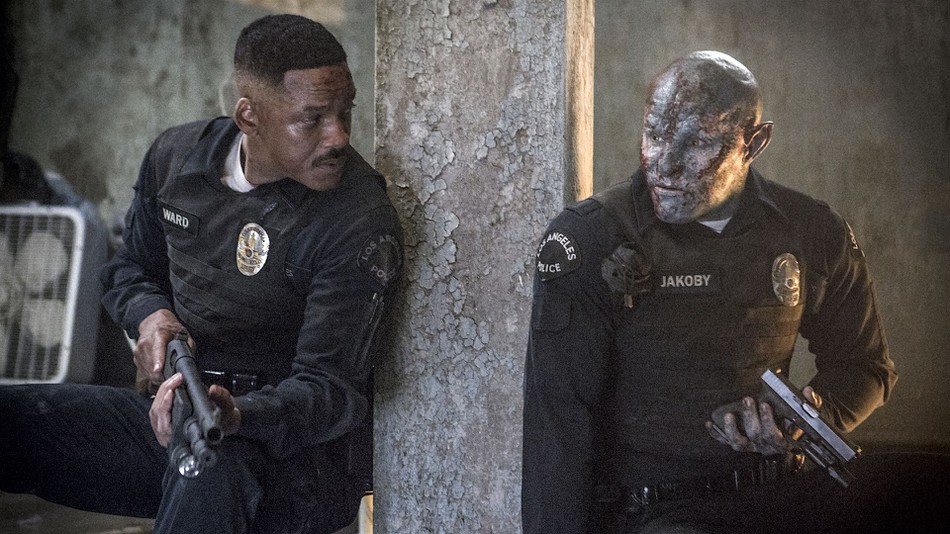
Bright
 Starring: Will Smith, Joel Edgerton, Noomi Rapace, Lucy Fry, Édgar Ramírez, Ike Barinholtz
Starring: Will Smith, Joel Edgerton, Noomi Rapace, Lucy Fry, Édgar Ramírez, Ike Barinholtz
Directed by: David Ayer
Written by: Max Landis
Back in the late 90’s, the “Buddy Cop” movie was definitely… a thing. Two men’s men against a world of ethnic gangs, big guns, and cheap-suit corruption. This was the era of being cool by not looking at explosions and walking away in slow motion. Since then, the genre has all but died. It’s almost ironic that Smith is starring in a new one, and it arguably shows off the best and worst of what the genre offered.
Bright is a Netflix movie set in an alternate-reality Los Angeles. The history of the world seems far more based on Tolkienesque stories of armies of good and evil clashing over magic and glory. For some reason, we’ve ended up more or less at the same 2017. There are humans, lower-class orcs, and higher-class elves. Simple enough. The first quarter of the movie seems to hammer in these plain-as-day socioeconomic tiers almost to a ridiculous degree. Which makes the viewer think that the film has quite a bit to say about racism and classes. It doesn’t, but we’ll get to that.
The story follows a recently-wounded cop named Ward (Will Smith) and his maligned of-two-worlds-trope orcish partner Jakoby (Joel Edgerton). They deal with orc gangbangers on one side and racist cops on the other. Ward and Jakoby don’t get along, and that adds a nice hint of tension in the first half of the movie. Eventually, the pair gets involved in some crazy stuff that is way above their pay grade (as these sorts of movies tend to have their leads mention at least once or twice).
Evil elves looking to resurrect a dark lord, a “nuclear weapon that grants wishes” magic wand, and Brights, who are the rare people capable of using these wands without exploding or worse. There’s very little wrong with Smith’s and Edgerton’s performances. Smith is an old pro in the genre, and Edgerton plays a role covered in prosthetics to sizable variety and effect. There’s a fair bit to enjoy.
Sadly, Bright gives us very little to care about. The unique marriage of elements that Bright puts forth could, in theory, lead to a really interesting story about trust, race, power and other very real issues. Heck, if you’re an old fan of the Shadowrun IP, all that’s missing is the cyberpunk elements. Instead, most of the movie is action scene after action scene interspersed with moments of artificial faux-catharsis and pumped-up vapourous import that leaves the viewer feeling left out of the loop. It’s as if you’re supposed to be “getting” something that feels both there and not. The third act all but forgets race issues. We’re left with by the credits is the sort of colour-by-numbers buddy cop shtick that has been played out for well over a decade.
 Almost exemplifying the film’s issues are the elven third and fourth main characters Tikka (Lucy Fry) and Leilah (Noomi Rapace). Tikka is far more of a MacGuffin than the wand is. She’s seemingly hanging around Ward and Jakoby to hold on to the wand and push the story forward, but only have minimal effect on any events. In fact, it’s almost jarring how she’s nearly absent from almost every action scene while at the same time very much being in the scene.
Almost exemplifying the film’s issues are the elven third and fourth main characters Tikka (Lucy Fry) and Leilah (Noomi Rapace). Tikka is far more of a MacGuffin than the wand is. She’s seemingly hanging around Ward and Jakoby to hold on to the wand and push the story forward, but only have minimal effect on any events. In fact, it’s almost jarring how she’s nearly absent from almost every action scene while at the same time very much being in the scene.
Leilah, on the other hand, is the main antagonist without feeling at all antagonistic. Sure, she kills a few people and wants to bring back a dark lord to enslave the world. It’s exceptionally hard to feel any weight to that. She’s definitely not menacing and not once do we feel the weight of a dark lord backing her up. In fact, at no point in the movie does anything at all really feel in jeopardy.
VERDICT: It would be a tad harsh to suggest a hard pass on Bright. There are interesting elements to enjoy, even from a far-too-safe genre-laden setting and a story filled with wasted opportunities. There’s word that Netflix wants to turn Bright into a franchise. If they do, I really hope they do some very serious retooling. For now, add it to your list. Maybe you’ll come across it when you’re in the mood for The Fellowship of Bad Boys.

![[REACTION] ‘THE SUICIDE SQUAD’ TRAILER](https://geekd-out.com/wp-content/uploads/2021/03/The-Suicide-Squad-Poster-Shows-Off-New-Teams-Different-Weapons-150x150.jpg)

